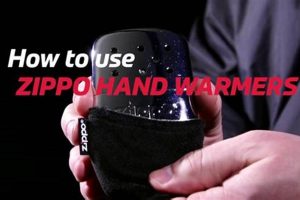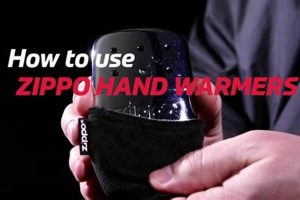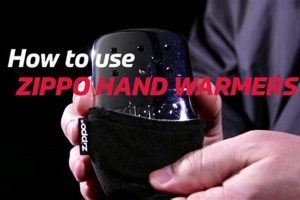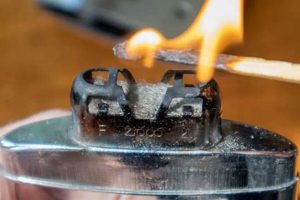Ronsonol lighter fluid, while a common fuel for lighters, is not recommended for use in Zippo hand warmers. These warmers are designed for a specific catalytic process using Zippo premium lighter fluid or butane fuel, depending on the model. Using other fuels can produce inconsistent heat, release harmful fumes, or even damage the device, potentially creating a fire hazard. For optimal and safe performance, users should adhere to manufacturer recommendations and employ only the intended fuel.
The correct fuel ensures the catalytic burner operates at the intended temperature and prevents damage to the platinum catalyst. This catalyst is crucial for the hand warmer’s functionality, facilitating a flameless, odorless, and long-lasting heat generation. Using inappropriate fuels may compromise this process, reducing the warmer’s lifespan and creating safety risks. Historically, hand warmers have evolved from rudimentary, potentially dangerous methods to sophisticated, self-contained units, highlighting the importance of following safety guidelines and using the correct fuel.
This exploration of fuel compatibility for hand warmers emphasizes the broader importance of user awareness regarding product specifications and safety precautions. The following sections will delve into the specific mechanisms of Zippo hand warmers, the properties of various fuels, and further safety recommendations for their proper use.
Tips for Fueling Zippo Hand Warmers
Safe and effective operation of catalytic hand warmers relies heavily on proper fueling. These tips provide guidance for ensuring optimal performance and mitigating potential hazards.
Tip 1: Consult the Manufacturer’s Instructions: Always refer to the specific instructions provided with the hand warmer model. Different models may have varying fuel requirements.
Tip 2: Use Only Recommended Fuel: Zippo hand warmers are designed for Zippo premium lighter fluid or butane fuel, depending on the model. Avoid using other fuels like Ronsonol or generic lighter fluids, as they can damage the device or create safety risks.
Tip 3: Fill in a Well-Ventilated Area: Fueling should occur outdoors or in a well-ventilated space away from open flames or ignition sources. This precaution minimizes the risk of accidental ignition of fuel vapors.
Tip 4: Avoid Overfilling: Fill the warmer to the designated fill line indicated on the device. Overfilling can lead to fuel leakage and increase fire hazards.
Tip 5: Secure the Filler Cap Tightly: Ensure the filler cap is securely closed after fueling to prevent leaks and fuel evaporation. This also helps maintain optimal performance.
Tip 6: Store Fuel Safely: Store hand warmer fuel in a cool, dry place away from children and heat sources. Proper storage minimizes the risk of accidental fires or spills.
Tip 7: Inspect the Warmer Regularly: Periodically check the hand warmer for any signs of damage, leaks, or malfunction. If any issues are detected, discontinue use and consult the manufacturer or a qualified technician.
Adhering to these fuel-related precautions contributes significantly to safe and effective hand warmer operation, maximizing its lifespan and minimizing potential risks.
By understanding and following these guidelines, users can confidently enjoy the warmth and convenience of their hand warmers while prioritizing safety. The concluding section will reiterate key safety points and offer additional resources for safe hand warmer usage.
1. Fuel Compatibility
Fuel compatibility plays a crucial role in the safe and effective operation of Zippo hand warmers. The question of whether Ronsonol can be used in these devices hinges directly on this critical factor. Using an incompatible fuel can lead to various issues ranging from reduced performance to potential safety hazards. Understanding the nuances of fuel compatibility is essential for anyone using a catalytic hand warmer.
- Chemical Composition and Reactivity
Different fuels possess varying chemical compositions and reactivities. Zippo hand warmers are designed specifically for Zippo premium lighter fluid or butane, depending on the model. These fuels are formulated to work with the catalyst in the warmer, ensuring controlled combustion and optimal heat output. Ronsonol, while also a lighter fluid, may have a different chemical composition that could react differently with the catalyst, potentially damaging the device or producing undesirable byproducts.
- Burning Temperature and Heat Output
The burning temperature of a fuel directly impacts the heat output of the hand warmer. Using a fuel like Ronsonol, which may burn at a different temperature than the recommended fuel, could result in insufficient heat generation or, conversely, excessive heat that could damage the device or create a fire hazard. The catalyst is designed to operate within a specific temperature range, and using an incompatible fuel can disrupt this delicate balance.
- Catalytic Converter Compatibility
The catalytic converter in a Zippo hand warmer is a crucial component that facilitates the flameless combustion process. This converter is designed to work with specific fuels. Introducing a different fuel, such as Ronsonol, can damage the catalyst, reducing its effectiveness and shortening the lifespan of the hand warmer. This can also affect the odorless operation of the warmer.
- Safety Considerations and Risks
Using incompatible fuels in a hand warmer poses several safety risks. The incorrect fuel can produce harmful fumes or increase the risk of fire. Additionally, using an incompatible fuel can void the manufacturer’s warranty, leaving the user without recourse in case of malfunction or damage. Sticking to the recommended fuel is the safest and most reliable approach.
In conclusion, fuel compatibility is not simply a matter of convenience but a critical safety and performance consideration for Zippo hand warmers. Using Ronsonol or any fuel other than the manufacturer’s recommendation can have detrimental consequences, impacting the device’s effectiveness and potentially creating hazardous conditions. Adhering to the recommended fuel type ensures optimal performance, longevity, and, most importantly, user safety.
2. Safety Risks
Utilizing Ronsonol in Zippo hand warmers presents several safety risks, stemming primarily from the incompatibility of the fuel with the device’s design and intended operation. These risks range from immediate hazards like fire and harmful fumes to long-term damage that can compromise the warmer’s functionality and create further safety concerns. Understanding these risks is crucial for responsible hand warmer usage.
- Fire Hazard
Ronsonol’s different flash point and burning characteristics compared to Zippo premium lighter fluid or butane can increase the risk of unintended ignition. The improper combustion resulting from using Ronsonol can produce higher temperatures or uncontrolled flames, posing a significant fire hazard, particularly during the filling process or if the warmer leaks. Cases of hand warmer fires, though rare with proper fuel, underscore the importance of using the correct fuel type.
- Harmful Fumes
Using Ronsonol can lead to the production of harmful fumes due to incomplete combustion or the release of volatile organic compounds not present in the recommended fuels. Inhaling these fumes can cause respiratory irritation or other health problems, especially in confined spaces. The potential for carbon monoxide production, while lower than with traditional combustion, is also a concern with improper fuel usage.
- Malfunction and Damage
Ronsonol can damage the catalytic converter within the hand warmer. This damage can lead to malfunctions, reducing heat output and potentially causing dangerous overheating or leaks. Over time, the use of incompatible fuel can render the warmer completely unusable, requiring costly repairs or replacement.
- Burns and Skin Irritation
While hand warmers are designed to provide safe, consistent heat, using the wrong fuel can lead to unpredictable temperature fluctuations. This can result in burns or skin irritation if the warmer becomes excessively hot due to improper combustion. Using Ronsonol can exacerbate this risk due to its potential for uncontrolled burning.
The safety risks associated with using Ronsonol in a Zippo hand warmer underscore the importance of adhering to manufacturer recommendations. Choosing the correct fuel is not merely a matter of performance but a critical safety precaution. Ignoring these guidelines can lead to serious consequences, jeopardizing user safety and potentially causing harm. Opting for the specified fuel ensures safe and reliable operation, mitigating these risks and promoting responsible hand warmer usage.
3. Performance Issues
Performance issues directly link to the question of Ronsonol’s suitability for Zippo hand warmers. Using Ronsonol, an incompatible fuel, can significantly impact the warmer’s intended function, leading to diminished heat output, inconsistent performance, and a shorter lifespan. The catalyst, designed for specific fuel properties, functions suboptimally with Ronsonol. This results in incomplete combustion, reducing the chemical reaction that generates heat. Instead of consistent, reliable warmth, users may experience fluctuating temperatures and a shorter duration of heat production. For instance, a hand warmer fueled with Ronsonol might initially produce adequate heat, but quickly fade, offering significantly less warmth over time compared to one using the recommended fuel. This diminished performance negates the primary purpose of the device, particularly in cold environments where consistent heat is essential.
Furthermore, using Ronsonol can clog the burner mechanism over time. Residue from incomplete combustion accumulates, obstructing fuel flow and further hindering heat production. This can lead to a complete failure of the device. Consider a scenario where a user relies on a hand warmer during a winter camping trip. If the warmer, fueled with Ronsonol, fails to produce adequate heat due to clogging, the individual risks cold-related injuries. This illustrates the practical significance of understanding the performance implications of using the incorrect fuel. Choosing the correct fuel is essential not only for optimal performance but also for safety and reliability in situations where consistent warmth is crucial.
In summary, using Ronsonol in a Zippo hand warmer directly leads to diminished performance, inconsistent heat output, and a shortened lifespan. The practical consequences of these performance issues can range from mere inconvenience to serious safety concerns in cold weather conditions. Understanding the direct link between fuel type and performance is therefore crucial for safe and effective hand warmer operation. Adhering to manufacturer recommendations regarding fuel type ensures optimal performance, reliability, and safety.
4. Manufacturer Recommendations
Manufacturer recommendations regarding fuel type are paramount for safe and effective operation of Zippo hand warmers. Disregarding these recommendations, such as using Ronsonol instead of the specified fuel, can lead to significant safety risks, compromised performance, and potential damage to the device. Understanding the rationale behind these recommendations is crucial for responsible hand warmer usage.
- Safety Considerations
Manufacturers conduct rigorous testing to determine the optimal fuel for their devices, prioritizing user safety. Using unapproved fuels like Ronsonol can lead to unpredictable burning temperatures, increasing the risk of fire or burns. Manufacturer recommendations often include specific warnings against using alternative fuels, emphasizing the potential safety hazards. For example, a manufacturer might explicitly state that using anything other than their specified fuel voids the warranty and increases the risk of fire. This highlights the serious safety implications of disregarding manufacturer guidelines.
- Performance Optimization
Manufacturer recommendations are also geared towards optimizing performance. The specified fuel is formulated to work seamlessly with the hand warmer’s design, ensuring consistent heat output and maximum efficiency. Using Ronsonol can disrupt this delicate balance, leading to reduced heat output, inconsistent performance, and a shorter lifespan for the device. A common example is reduced burn time when using an incompatible fuel, forcing users to refill the warmer more frequently and potentially damaging the device over time.
- Warranty and Liability
Using fuels not explicitly approved by the manufacturer often voids the warranty. This means any damage resulting from the use of Ronsonol would not be covered, leaving the user responsible for repair or replacement costs. Manufacturers provide clear guidelines regarding fuel type to protect both the user and the company from potential liability arising from improper usage. Warranty information often includes a list of approved fuels, emphasizing the importance of adhering to these recommendations for continued coverage.
- Long-Term Functionality and Device Integrity
Manufacturer recommendations aim to preserve the long-term functionality and integrity of the hand warmer. Using Ronsonol can damage the catalytic converter, a crucial component for safe and efficient operation. This damage can lead to reduced performance, malfunctions, and ultimately, a shorter lifespan for the device. For example, repeated use of Ronsonol can clog the burner, requiring extensive cleaning or even replacement of the unit. Following manufacturer guidelines helps ensure the longevity and reliable performance of the hand warmer.
In conclusion, manufacturer recommendations regarding fuel type are not arbitrary restrictions but crucial guidelines designed to ensure user safety, optimize performance, and maintain the integrity of the device. Disregarding these recommendations, particularly by using Ronsonol or other unapproved fuels, can have significant negative consequences, ranging from safety hazards to compromised performance and voided warranties. Adhering to manufacturer guidelines is essential for responsible and effective hand warmer usage.
5. Warranty Implications
Warranty implications are directly relevant to the question of using Ronsonol in a Zippo hand warmer. Zippo provides warranties covering defects in materials and workmanship under normal use. However, using Ronsonol, an unapproved fuel, can void this warranty, leaving the consumer responsible for repair or replacement costs. Understanding these implications is crucial for making informed decisions about fuel usage and protecting one’s investment.
- Fuel Type Stipulations
Zippo’s warranty explicitly states that using fuels other than Zippo premium lighter fluid or butane, depending on the model, can void the warranty. This stipulation stems from the potential damage incompatible fuels like Ronsonol can inflict on the hand warmer’s components. For example, if the catalytic converter is damaged due to the use of Ronsonol, any repairs required would not be covered under warranty. This reinforces the importance of adhering to manufacturer recommendations for fuel type.
- Burden of Proof
If a malfunction occurs, the burden of proof often falls on the consumer to demonstrate that the issue was not caused by the use of an unapproved fuel. This can be challenging, particularly if the damage is internal and not readily apparent. For instance, even if a manufacturing defect exists, if evidence of Ronsonol usage is present, the warranty claim might be denied. This highlights the difficulty consumers face in proving they adhered to fuel guidelines, especially after a malfunction.
- Financial Responsibility
Voiding the warranty through the use of Ronsonol transfers the financial responsibility for repairs or replacement entirely to the consumer. Hand warmers, while relatively inexpensive, can still represent a significant investment, particularly for frequent users. Incurring repair or replacement costs due to avoidable damage from using Ronsonol creates unnecessary expenses. This underscores the financial benefits of adhering to warranty guidelines regarding fuel usage.
- Safety and Liability
While not directly related to warranty coverage, using Ronsonol can create safety hazards not covered by the warranty. For example, if a fire occurs due to the use of Ronsonol, the warranty would not cover the resulting damages. This places the entire liability on the consumer, reinforcing the importance of following manufacturer recommendations for both warranty coverage and personal safety. This connection between warranty implications and safety further emphasizes the importance of using approved fuels.
In summary, the warranty implications associated with using Ronsonol in a Zippo hand warmer are substantial. Voiding the warranty through improper fuel usage can lead to significant financial burdens and negate the consumer protection provided by the manufacturer. Adhering to the recommended fuel type not only safeguards the warranty but also ensures safe and optimal performance, protecting both the investment and the user. The potential loss of warranty coverage reinforces the importance of using approved fuels and following manufacturer guidelines.
6. Proper Fuel Types
Proper fuel selection is crucial for the safe and effective operation of Zippo hand warmers. The question of whether Ronsonol can be used in these devices highlights the importance of understanding fuel compatibility and its implications. Using the correct fuel ensures optimal performance, prevents damage, and mitigates safety risks.
- Chemical Composition and Compatibility
The chemical composition of a fuel directly impacts its compatibility with a given device. Zippo hand warmers are designed for Zippo premium lighter fluid or butane, depending on the model. These fuels have specific chemical properties that enable the catalytic converter to function correctly and produce the desired heat output. Ronsonol, while also a lighter fluid, may have a different chemical composition, leading to incomplete combustion, reduced heat output, or damage to the catalytic converter. This incompatibility underscores the importance of selecting a fuel specifically designed for the device.
- Burning Characteristics and Safety
Different fuels exhibit varying burning characteristics, including flash point and burning temperature. Using a fuel like Ronsonol, which may have different burning characteristics than the recommended fuel, can create safety hazards. An incorrect flash point could lead to unintended ignition, while an inappropriate burning temperature might damage the device or produce harmful fumes. The potential for uncontrolled combustion with an incompatible fuel emphasizes the safety implications of proper fuel selection.
- Performance and Efficiency
Fuel type directly affects the performance and efficiency of a Zippo hand warmer. The recommended fuels are formulated to maximize heat output and burn duration. Using Ronsonol could result in reduced heat output, inconsistent performance, and a shorter lifespan for the device. For example, a user might experience significantly less heat and a shorter burn time with Ronsonol compared to the recommended fuel, rendering the hand warmer ineffective in cold conditions. This highlights the practical importance of using the correct fuel for optimal performance.
- Manufacturer Specifications and Warranty
Manufacturers provide specific fuel recommendations for their products, not only for safety and performance but also to maintain warranty coverage. Using unapproved fuels like Ronsonol can void the warranty, leaving the consumer responsible for any repairs or replacements. This underlines the importance of consulting the manufacturer’s instructions and adhering to their recommendations regarding fuel type to protect both the device and the warranty. Choosing the correct fuel demonstrates responsible product usage and ensures continued warranty protection.
In conclusion, the question of using Ronsonol in a Zippo hand warmer emphasizes the broader importance of understanding proper fuel types and their implications. Fuel selection is not simply a matter of preference but a critical consideration for safety, performance, and warranty coverage. Using the correct fuel, as specified by the manufacturer, ensures optimal and safe operation, maximizing the lifespan of the device and protecting the consumer’s investment.
7. Damage Potential
Damage potential represents a significant consideration regarding the use of Ronsonol in Zippo hand warmers. Employing an incompatible fuel like Ronsonol can lead to various detrimental effects on the device, impacting its functionality, lifespan, and safety. This potential for damage stems from the interaction between the fuel’s chemical properties and the hand warmer’s design, specifically the catalytic converter.
The catalytic converter, a crucial component of Zippo hand warmers, facilitates a flameless, odorless heating process. This component is designed for use with specific fuels, typically Zippo premium lighter fluid or butane, depending on the model. These fuels possess chemical properties that ensure optimal catalytic activity and controlled combustion. Ronsonol, however, may possess different chemical properties, leading to several potential damage scenarios. Incomplete combustion, a common consequence of using incompatible fuels, can produce sooty residue that clogs the fine pores of the catalytic converter. This clogging reduces the converter’s effectiveness, diminishing heat output and potentially leading to complete failure. Furthermore, the chemical reaction between Ronsonol and the catalyst might generate excessive heat, potentially damaging the converter or other internal components. For instance, repeated use of Ronsonol could lead to a cracked catalytic converter, rendering the hand warmer unusable. In extreme cases, using an incompatible fuel could even lead to a fire hazard.
Understanding the damage potential associated with using Ronsonol in a Zippo hand warmer is crucial for responsible and safe operation. This understanding reinforces the importance of adhering to manufacturer recommendations regarding fuel type. Choosing the correct fuel not only optimizes performance but also safeguards the device from potential damage, preserving its functionality and extending its lifespan. Ignoring these recommendations can lead to costly repairs, premature device failure, and potential safety hazards. The potential for irreversible damage emphasizes the practical significance of using only the recommended fuel types.
Frequently Asked Questions
This section addresses common inquiries regarding fuel usage in Zippo hand warmers, focusing on the implications of using Ronsonol and other non-recommended fuels.
Question 1: What are the specific risks of using Ronsonol in a Zippo hand warmer?
Using Ronsonol can damage the catalytic converter, reduce heat output, produce harmful fumes, and increase the risk of fire. The chemical incompatibility between Ronsonol and the hand warmer’s design creates these potential hazards.
Question 2: Why does Zippo recommend specific fuel types for their hand warmers?
Zippo recommends specific fuels to ensure optimal performance, maximize lifespan, and maintain safety standards. These fuels are rigorously tested for compatibility with their hand warmers.
Question 3: Will using Ronsonol void the warranty on a Zippo hand warmer?
Yes, using any fuel other than those explicitly recommended by Zippo will void the warranty. This means any damage resulting from the use of Ronsonol will not be covered by Zippo.
Question 4: Are there performance differences between using Ronsonol and the recommended fuel?
Significant performance differences exist. Ronsonol can lead to reduced heat output, inconsistent performance, and a shorter burn time compared to the recommended fuel.
Question 5: What type of fuel should be used in a Zippo hand warmer?
Consult the specific model instructions. Zippo generally recommends Zippo premium lighter fluid or butane fuel, depending on the hand warmer model.
Question 6: Where can one find official fuel recommendations for Zippo hand warmers?
Official fuel recommendations can be found in the product manual accompanying the hand warmer or on the official Zippo website. Consulting these resources provides definitive guidance.
Adhering to manufacturer recommendations regarding fuel type is crucial for safe, effective, and long-lasting hand warmer operation. Prioritizing safety and performance ensures optimal device functionality and mitigates potential risks.
The following section will offer a concluding summary of key takeaways regarding fuel compatibility and safe hand warmer practices.
Conclusion
Exploration of the question “Can I use Ronsonol in a Zippo hand warmer?” reveals significant safety and performance concerns. Ronsonol’s incompatibility with Zippo hand warmers stems from its differing chemical composition compared to the recommended fuels. This incompatibility can lead to diminished heat output, damage to the catalytic converter, the production of harmful fumes, and an increased risk of fire. Furthermore, using Ronsonol voids the manufacturer’s warranty, leaving consumers financially responsible for any resulting damages. The potential consequences of using an incompatible fuel underscore the importance of adhering to manufacturer guidelines.
Safe and effective hand warmer operation requires diligent adherence to manufacturer specifications. Utilizing the correct fuel is not merely a recommendation but a crucial safety precaution. Prioritizing informed fuel selection ensures optimal performance, prolongs the device’s lifespan, and mitigates potentially serious risks. Continued awareness of fuel compatibility and adherence to safety guidelines are essential for responsible hand warmer usage.







